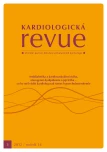Lipid-modifying therapies of tomorrow – what will they be like?
Authors:
M. Vráblík
Published in:
Kardiol Rev Int Med 2012, 14(3): 172-715
Category:
Overview
The gradual reduction of the risk of atherothrombotic complications using drugs affecting serum lipid levels is now rightly considered to be one of the cardiovascular prevention pillars. Yet a number of patients with a high risk of vascular accidents do not reach the target values for various reasons. The search for new methods of lowering the risk by intervening in the metabolic transformation of serum lipoproteins continues and recently a number of interesting innovations have appeared. Procedures enabled by biotechnology development have been coming to the forefront and drugs preventing apoprotein translation (such as apoB, apo(a)), drugs inhibiting the protein-receptor interaction (such as monoclonal antibodies against PCSK9) or peptides inducing antibody response with similar effects are being clinically tested. In addition, the development of “traditional” methods continues and the established drug groups of statins or fibrates may expand in the future. However, we have to be patient and wait until new drugs unequivocally demonstrate their effects in clinical studies.
Keywords:
lipid-modifying treatment – statins – fibrates – mipomersen – loperamide – antiPCSK9 – CETP inhibitors
Sources
1. Yokote K, Bujo H, Hanaoka H et al. Multicenter collaborative randomized parallel group comparative study of pitavastatin and atorvastatin in Japanese hypercholesterolemic patients: collaborative study on hypercholesterolemia drug intervention and their benefits for atherosclerosis prevention (CHIBA study). Atherosclerosis 2008; 201 : 345–352.
2. Kimura K, Shimano H, Yokote K et al. Effects of pitavastatin (LIVALO tablet) on the estimated glomerular filtration rate (eGFR) in hypercholesterolemic patients with chronic kidney disease: sub-analysisofthe LIVALO Effectiveness and Safety (LIVES) study. J Atheroscler Thromb 2010; 17 : 601–609.
3. Sauron R, Wilkins M, Jessent V et al. Absence of food effect with a 145 mg nanoparticle fenofibrate tablet formulation. Int J Clin Pharmacol Ther 2006; 44 : 64–70.
4. Takizawa T, Murakami K, Yano W et al. K-877, a highlypotent and selective PPARaagonist, improves dyslipidemia and atherosclerosis in experimental animal models. Milan: 80th congres EAS 2012.
5. Younk LM, Uhl L, Davis SN. Pharmacokinetics, efficacy and safety of aleglitazar for the treatment of type 2 diabetes with high cardiovascular risk. Expert Opin Drug Metab Toxicol 2011; 7 : 753–763.
6. Cannon CP. High-density lipoprotein cholesterol as the Holy Grail. JAMA 2011; 306 : 2153–2155.
7. Nissen SE, Tardig JC, Nicholls SJ et al. ILLUSTRATE Investigators. Effects of torcetrapib on the progression of coronary atherosclerosis. N Engl J Med 2007; 356 : 1304–1316.
8. Roche, Inc. Roche provides update on Phase III study of dalcetrapib. Press release. May 12, 2012. Dostupné na www.roche.com/media.
9. Cuchel M, Bloedon LT, Szapary PO et al. Inhibition of microsomal triglyceride transfer protein in familial hypercholesterolemia. N Engl J Med 2007; 356 : 148–156.
10. Galabova G, Wanko B, Winsauer G et al. AFFITOPE®-based active immunization targeting PCSK9 for the treatment of atherosclerosis. Milan: 80th Congres EAS 2012.
11. Raal FJ, Santos RD, Blom DJ et al. Mipomersen, anapolipoprotein B synthesis inhibitor, for lowering of LDL cholesterol concentrations in patients with homozygous familial hypercholesterolaemia: a randomised, double-blind, placebo-controlled trial. Lancet 2010; 375 : 998–1006.
12. Cohen CJ, Boerwinkle E, Mosley TH Jr et al. Sequence variations in PCSK9, low LDL and protection against coronary heart disease. N Engl J Med 2006; 354 : 1264–1272.
13. Stein E, Mellis S, Yancoupoulos GD et al. Effects of a monoclonal antibody to PCSK9 on LDL cholesterol levels. N Engl J Med 2012; 366 : 1108–1118.
14. Dostupné na www.clinicaltrials.gov, přístup dne 15. 6. 2012.
Labels
Paediatric cardiology Internal medicine Cardiac surgery CardiologyArticle was published in
Cardiology Review

2012 Issue 3
-
All articles in this issue
- Antidiabetic drugs and cardiovascular risk – before and now
- Importance of determining apolipoproteins B and A-1 in clinical practice
- Residual vascular risk and the possibilities of therapy.
- Lipid-modifying therapies of tomorrow – what will they be like?
- Sudden death in cardiology
- Hypertriglyceridemia and cardiovascular risk
- Troponin as a prognostic risk factor in patients hospitalized for decompensation of chronic systolic heart failure
- The use of levosimendan: up-date 2012
- Ticagrelor in patients with acute coronary syndrome
-
Antithrombotics in the prevention of cerebrovascular accidents.
Part I – Significance of antiplatelet treatment - Renal denervation and its role in the treatment of resistant hypertension
- Mitral stenosis in the terminal phase – a case report
- Cardiology Review
- Journal archive
- Current issue
- About the journal
Most read in this issue
- Importance of determining apolipoproteins B and A-1 in clinical practice
- Ticagrelor in patients with acute coronary syndrome
- Hypertriglyceridemia and cardiovascular risk
- Troponin as a prognostic risk factor in patients hospitalized for decompensation of chronic systolic heart failure
